Behind every successful entrepreneur, is a couple of failed attempts.
Bill Gates will forever be remembered for starting Microsoft, but this was actually not his first business venture. Before Microsoft, Bill Gates and Paul Allen built a company called Traf-O-Data. They wanted to build a “computerized machine for processing paper tapes from traffic counters.” They planned to sell this computerized data to state and local governments, but failed because the product was unacceptably buggy. The experience gained in this venture would later be used to write Altair BASIC for the MITS Altair 8800 computer and start Microsoft. Paul Allen now refers to it as his favourite mistake.
FailCon Singapore
[caption id=“attachment_11991” align=“alignnone” width=“457” caption=“Failcon SG Executive Producer, Kristine Lauria, making her opening remarks about why it’s important to talk about failure in this region. We love you Kristine!”]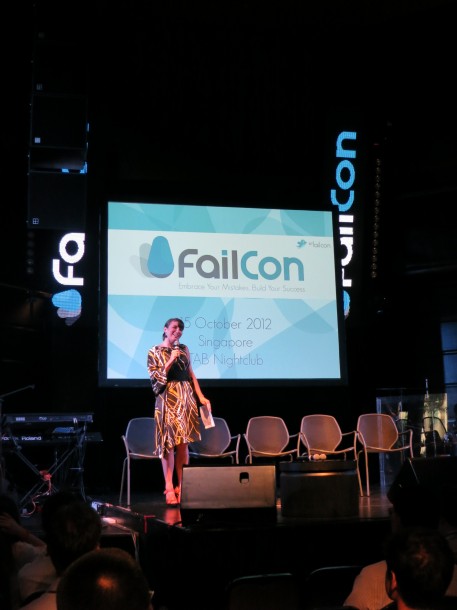 [/caption] The word ‘fail’ is a taboo in every part of the world. Everyone is afraid of failure, perhaps with the exception of Silicon Valley - where people seem to embrace and talk about it openly. In the land of kiasu (which literally translates to afraid to lose) Singapore , where we were born and raised to give standard answers to O ten-years-series exercise books and not deviate too far from what our parents would deem as an “acceptable” way of life - failure is to be avoided at all cost. Not very good for the entrepreneurship scene. FailCon was held yesterday at TAB. A one day conference for startup founders, investors, developers and designers to share their failures and prepare for success. Speakers included Ben Huh of Cheezburger fame, Patrick Lee of alivenotdead.com (previously founded Rotten Tomatoes) and the funny Paul Bragiel of Golden Gate Ventures. I’ve distilled five lessons I learnt from their amazing stories.
[/caption] The word ‘fail’ is a taboo in every part of the world. Everyone is afraid of failure, perhaps with the exception of Silicon Valley - where people seem to embrace and talk about it openly. In the land of kiasu (which literally translates to afraid to lose) Singapore , where we were born and raised to give standard answers to O ten-years-series exercise books and not deviate too far from what our parents would deem as an “acceptable” way of life - failure is to be avoided at all cost. Not very good for the entrepreneurship scene. FailCon was held yesterday at TAB. A one day conference for startup founders, investors, developers and designers to share their failures and prepare for success. Speakers included Ben Huh of Cheezburger fame, Patrick Lee of alivenotdead.com (previously founded Rotten Tomatoes) and the funny Paul Bragiel of Golden Gate Ventures. I’ve distilled five lessons I learnt from their amazing stories.
Fail Lesson #01 : Don’t be too self conscious. No one really cares if you fail.
[caption id=“attachment_12007” align=“alignnone” width=“610” caption=“Ben Huh, who is Founder and CEO at Cheezburger sharing about how unexpectedly he became the owner of the world’s most successful cat picture sharing site with $30 million VC funding. Not by coincidence. And definitely with some failing along the way.”]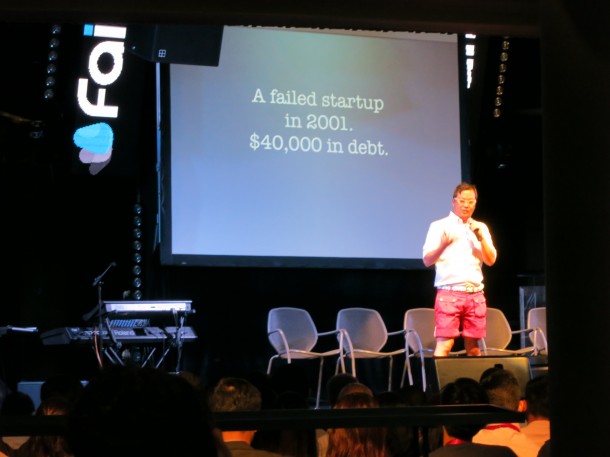 [/caption] Ben Huh, who is Founder and CEO of Cheezburger didn’t just stumble upon being the owner of the world’s most entertaining websites and then earning shit-loads of money from it. Equipped with a degree in journalism (uh huh, that’s right, journalism), his first company was focused on the decidedly unfunny vertical of web analytics, failing after 18 months. He was $40,000 in debt, but quickly got back on his feet. After working a succession of jobs, in 2007 he started blogging, founded I Can Haz Cheezburger, and bought the site. When faced with the choice to progress up the ladder, working for someone else’s startup - or become the CEO of the world’s weirdest cat sharing site, he chose the latter. To this day it still baffles his investors why people are fascinated with an image of bacon on a cat, but what matters is that he understood that the internet allows us to be a weird, imperfect and still love each other for it. In his own words, “it is only failure when you don’t get back on your feet.”
[/caption] Ben Huh, who is Founder and CEO of Cheezburger didn’t just stumble upon being the owner of the world’s most entertaining websites and then earning shit-loads of money from it. Equipped with a degree in journalism (uh huh, that’s right, journalism), his first company was focused on the decidedly unfunny vertical of web analytics, failing after 18 months. He was $40,000 in debt, but quickly got back on his feet. After working a succession of jobs, in 2007 he started blogging, founded I Can Haz Cheezburger, and bought the site. When faced with the choice to progress up the ladder, working for someone else’s startup - or become the CEO of the world’s weirdest cat sharing site, he chose the latter. To this day it still baffles his investors why people are fascinated with an image of bacon on a cat, but what matters is that he understood that the internet allows us to be a weird, imperfect and still love each other for it. In his own words, “it is only failure when you don’t get back on your feet.”
Fail Lesson #02 : Make sure you like the people you work with, make doubly sure you work out all the necessary evils and responsibilities.
[caption id=“attachment_12004” align=“alignnone” width=“610” caption=“Andy Croll, CTO of Impluse Flyer says you’d better be sure you love the people you work with. “]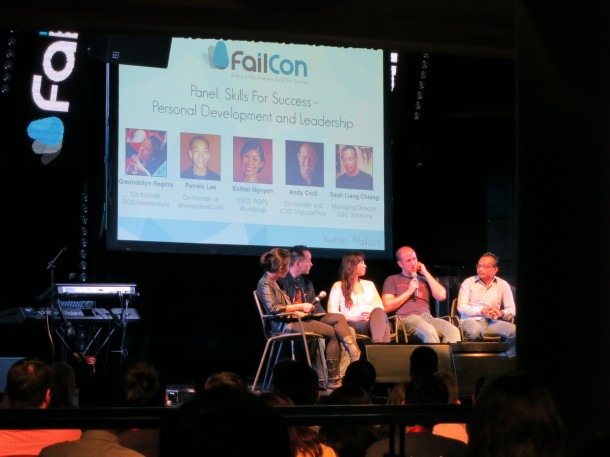 [/caption] Interestingly, a common theme for #fail in the conference seemed to be disagreements between co-founders. Entrepreneurship is tough work to go at alone. That’s why it pays to have someone else to share the load with you. Finding a suitable co-founder though, is equally tough. The panel discussion on personal development and leadership had varying opinions about how you should cement the relationships between founders. Both Andy Croll of Impulse Flyer and Seah Liang Chiang of DSC Solutions shared about their personal experiences about being “burnt” in co-founder relationships when they didn’t protect themselves with a co-founders agreement. Patrick Lee, who co-founded Rotten Tomatoes and is currently on his fourth startup, never had to have one. What they could agree on, is that it’s important to find a team that you genuinely like. You’re going to have to see these guys for 8 hours a day, possibly even more. And when shit hits the fan, you’d better make sure they’re the kinda of guys who are going to be there for you. A tip from Andy, have a place that facilitates the making of hard decisions. Brusselsprouts has a great array of beers and is apparently a nice bar to use as a boardroom when you’re making tough calls. Even if you failed, you should stick together as a team and start something else.
[/caption] Interestingly, a common theme for #fail in the conference seemed to be disagreements between co-founders. Entrepreneurship is tough work to go at alone. That’s why it pays to have someone else to share the load with you. Finding a suitable co-founder though, is equally tough. The panel discussion on personal development and leadership had varying opinions about how you should cement the relationships between founders. Both Andy Croll of Impulse Flyer and Seah Liang Chiang of DSC Solutions shared about their personal experiences about being “burnt” in co-founder relationships when they didn’t protect themselves with a co-founders agreement. Patrick Lee, who co-founded Rotten Tomatoes and is currently on his fourth startup, never had to have one. What they could agree on, is that it’s important to find a team that you genuinely like. You’re going to have to see these guys for 8 hours a day, possibly even more. And when shit hits the fan, you’d better make sure they’re the kinda of guys who are going to be there for you. A tip from Andy, have a place that facilitates the making of hard decisions. Brusselsprouts has a great array of beers and is apparently a nice bar to use as a boardroom when you’re making tough calls. Even if you failed, you should stick together as a team and start something else.
Fail Lesson #03 : Set your own metrics of success. Don’t fall prey to the fallacy of sunk costs.
[caption id=“attachment_12005” align=“alignnone” width=“610” caption=“Vinnie from Golden Gate Ventures, shared about his personal metrics on success and how he knew he had to quit his job at IBM when his eye started twitching.”]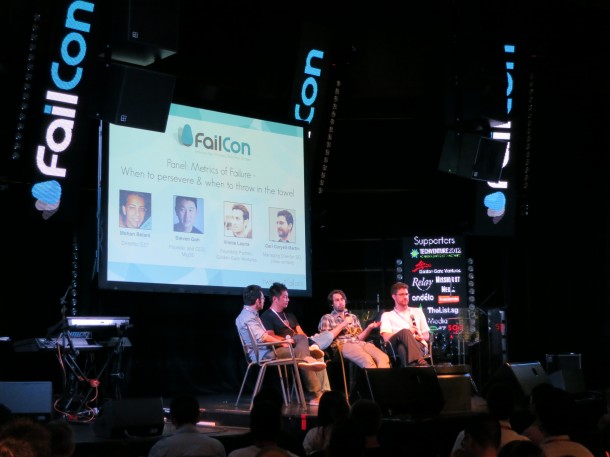 [/caption] The panel discussion on metrics of failure talked the all important issue of when to throw in the towel. Everyone has different expectations in life and there are no hard and fast rules or metrics to tell you when to give up or how to lead your life. So its critical for you to determine your set of metrics of success. Vinnie Lauria from Golden Gate Ventures shared a little about stress being a metric for himself. There are two kinds of stressed, the one that propels you forward and gets you getting shit done and the bad kind that makes your life miserable and can do no good. His eye started to twitch when he was so stressed from working at IBM, that he knew had to leave and start doing something of his own. A general rule is that you shouldn’t be worrying about sunk costs. You should be happy with what you’re doing, not staying on in a dying company just because you’ve invested too much in it. On the topic of money, Steven Goh from Mig33 had this to say, “Life is short, so do what you want. You hardly hear about people talking about their financial achievements on their deathbeds.” It’s more about the people you’ve touched in your life and the value you’ve created.
[/caption] The panel discussion on metrics of failure talked the all important issue of when to throw in the towel. Everyone has different expectations in life and there are no hard and fast rules or metrics to tell you when to give up or how to lead your life. So its critical for you to determine your set of metrics of success. Vinnie Lauria from Golden Gate Ventures shared a little about stress being a metric for himself. There are two kinds of stressed, the one that propels you forward and gets you getting shit done and the bad kind that makes your life miserable and can do no good. His eye started to twitch when he was so stressed from working at IBM, that he knew had to leave and start doing something of his own. A general rule is that you shouldn’t be worrying about sunk costs. You should be happy with what you’re doing, not staying on in a dying company just because you’ve invested too much in it. On the topic of money, Steven Goh from Mig33 had this to say, “Life is short, so do what you want. You hardly hear about people talking about their financial achievements on their deathbeds.” It’s more about the people you’ve touched in your life and the value you’ve created.
Fail Lesson #04 : Investors won’t hate you for failing. They only will if you didn’t give your 100%.
[caption id=“attachment_12003” align=“alignnone” width=“610” caption=“Paul Bragiel, who started his first company (doing game development) at age 20, challenges entrepreneurs to just do it.”]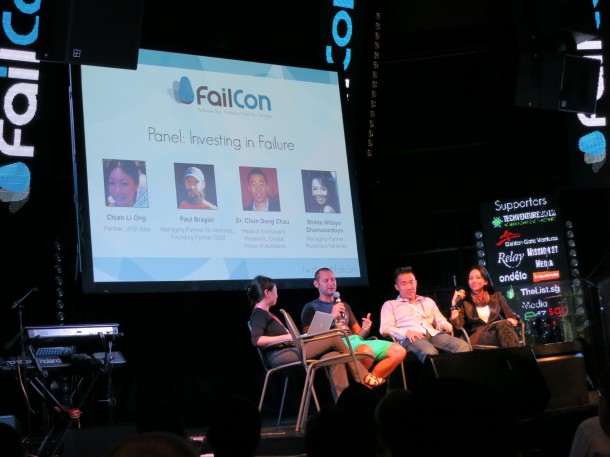 [/caption] The most passionate panel discussion of FailCon Singapore was about investing in failure. I loved the panelists, Paul Bragiel, Dr. Chun Dong Chau and Shinta Witoyo Dhanuwardoyo for sharing their fair share of failures and their unwavering belief in entrepreneurs. Most VCs do prefer entrepreneurs with a track record, but they also recognise that those who have failed in previous ventures are less risky to invest in because of the lessons and experience they’ve accumulated along the way. The only thing that you should be worrying about is that you are not doing your best. Failure has a funny way of setting you up for success. With Paul, his second startup Meetro had generated a lot of hype and raised enough money, but the product died when the hype died down as well. What he gained however, is a more experienced team, a network of VCs he was in contact with who had not invested in Meetro, but did in his third startup.
[/caption] The most passionate panel discussion of FailCon Singapore was about investing in failure. I loved the panelists, Paul Bragiel, Dr. Chun Dong Chau and Shinta Witoyo Dhanuwardoyo for sharing their fair share of failures and their unwavering belief in entrepreneurs. Most VCs do prefer entrepreneurs with a track record, but they also recognise that those who have failed in previous ventures are less risky to invest in because of the lessons and experience they’ve accumulated along the way. The only thing that you should be worrying about is that you are not doing your best. Failure has a funny way of setting you up for success. With Paul, his second startup Meetro had generated a lot of hype and raised enough money, but the product died when the hype died down as well. What he gained however, is a more experienced team, a network of VCs he was in contact with who had not invested in Meetro, but did in his third startup.
Fail Lesson #05 : It’s hard everywhere. Stop blaming it on everything else. Just go do it. You’re gonna be awesome - even if you fail.
[caption id=“attachment_12006” align=“alignnone” width=“610” caption=“Ben Huh’s final slide for his keynote. Life is never what it’s supposed to be. So stop worrying about failing. Get out there and live your life.”]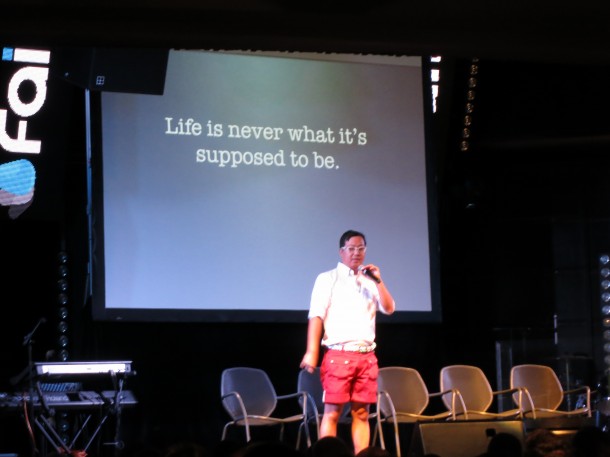 [/caption] The final #fail lesson is about not creating excuses for yourself. Good entrepreneurs will never become who they are without pushing themselves and failing from time to time. It’s tough to put yourself out there and let people criticize your ideas, how you’re executing them and then realize you’ve been building something that no one really wants. In fact, it really sucks, but it seems to be a necessary evil - and we need to be less afraid of failing and be more concerned with learning faster. Life is never what it’s supposed to be. You can always create all kinds of excuses to stop yourself from doing what you want to do, such as the market being too small, or that there isn’t enough money in Singapore for startups, or that you can’t hire good engineers - but at the end of the day, those are excuses. The biggest failure, is not to do anything at all. Kudos to the FailCon Singapore team for the amazing conference!
[/caption] The final #fail lesson is about not creating excuses for yourself. Good entrepreneurs will never become who they are without pushing themselves and failing from time to time. It’s tough to put yourself out there and let people criticize your ideas, how you’re executing them and then realize you’ve been building something that no one really wants. In fact, it really sucks, but it seems to be a necessary evil - and we need to be less afraid of failing and be more concerned with learning faster. Life is never what it’s supposed to be. You can always create all kinds of excuses to stop yourself from doing what you want to do, such as the market being too small, or that there isn’t enough money in Singapore for startups, or that you can’t hire good engineers - but at the end of the day, those are excuses. The biggest failure, is not to do anything at all. Kudos to the FailCon Singapore team for the amazing conference!
